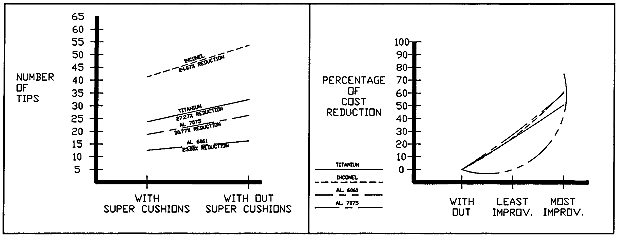Supercushions
 Reducing Carbide Breakage
Reducing Carbide Breakage
In Turning Operations
Using Ductile Precious Metals
by
Robert L. Martin BSME PhD.
EXPERIMENT
To measure the benefits of "Super Cushion" shock absorbers in reducing cutting tip chipping and breakage within a controlled production environment. Three jobs were observed for the purpose of this analysis. Each job was identical in terms of machine configuration, speed rates and materials. "Super Cushions" were inserted under the cutting tips of two of the four lathes used in this experiment.

The results indicate a significant reduction in cutting tip breakage on inserts using "Super Cushion" shock absorbers. While replacement ratios varied depending on the materials being cut, overall performance of "Super Cushion" greatly reduced tooling operation cost.
INTRODUCTION
The "Super Cushion" is an engineered, multi‑layered cushion which acts as a shock absorber for inserted cutting tool tips. The product was designed and developed by Carbide Processors, Inc. of Tacoma, Washington. The "Super Cushion" consists of two soft outer layers of precious metal based alloys and a hard inner layer of a base material. These materials form a ductile cushion which absorbs shocks applied to the cutting tool tip during cutting operations. A cutting tool tip is constantly and routinely subjected to impact stresses. In a standard tool/holder configuration the stresses directly impact the insert which is backed by relatively unyielding steel. This is equivalent to placing the insert between a hammer and an anvil. The "Super Cushion" yields and absorbs impact shock to gradually dampen and eliminate it so the insert survives. The "Super Cushion" shock absorber is described as "A Means of Reducing or Eliminating Breakage in Cutting Tool Tips" in patent application 07/448752.
DEMONSTRATION
Computer simulation was initially used to evaluate the effectiveness of the "Super Cushion." The results showed conclusively that the presence of "Super Cushions" substantially reduced the incidence of cutting tool tip breakage.
We now needed a real world environment to fully test the "Super Cushion" under controlled production conditions. We were very fortunate in securing the cooperation of a production machining facility in the Pacific Northwest. The company has been in business over twenty‑five years and has just completed a major overhaul involving the building of a new plant and the installation of state of the art machinery The company also has very sophisticated production controls for costing. The company is well over the $10,000,000 gross sales level and is certified to do military and aircraft work.
METHODOLOGY
Four Mazak CNC lathes were used for testing purposes. Each lathe had its own operator. Machine ages varied from less than a year old to approximately two years old. Sandvik CNMG straight carbide negative/negative inserts were used on all lathes. "Super Cushions" were used on the cutting tips of two of the four lathes.
The testing period covered three jobs and ran for a total of 104 man hours. Materials machined were identical for all three jobs and included Titanium, Inconel x 635, Aluminum 6061 and Aluminum 7075. Cutting conditions were equally similar in tooling and specified feed rates. Approximately 20% of the test involved interrupted cuts, 75% inside diameter turning, and 25% outside diameter turning. Production rates were roughly equivalent.
ILLUSTRATION
The following chart illustrates the effectiveness of the "Super Cushion" during actual production operations. The same four materials where used for each of the three jobs. Comparisons are made between inserts using a "Super Cushion" and inserts not using "Super Cushion:"
Total Inserts Used to Finish Job
WITH "SUPER CUSHION" WITHOUT "SUPER CUSHION"
JOB (1) JOB (2) JOB (3) JOB (1) JOB (2) JOB (3)
TITANIUM 8 8 8 10 12 11
INCONEL 14 13 14 17 21 16
AL 6061 4 4 4 4 5 7
AL7075 6 7 5 9 9 8
TOTAL NO. BY JOB 32 32 21 40 47 42
The following diagrams depict insert replacement curves by material type:

ANALYSIS
Reduction in inserts used on "Super Cushion" equipped machines by material type:
Ratios % Reduction in parts % Savings
Titanium 24/33 27.27 % reduction 37.50 % savings
Inconel 41/54 24.07 % 31.71 %
Al 6061 12/16 25.00 % 33.33 %
Al 7075 18/26 30.77 % 44.44 %
Least improvement Most improvement Average
Titanium 24% cost reduction 50 % 32 %
Inconel 24 % 61 % 31 %
Aluminum 6061 none 75% 33%
Aluminum 7075 28% 60% 44%
Worst incident: No improvement Aluminum 6061
Best incident: 75% improvement Aluminum 6061
The following diagrams indicate the percentage of cost reduction:

CONCLUSION
The use of "Super Cushion" shock absorbers extended the run time of the carbide inserts by an overall average of 36.25% in an actual production environment. The lathes using "Super Cushions" required 95 inserts while the lathes without "Super Cushions" required 129 inserts. The "Super Cushion" lathes had a tooling cost that was approximately 26.3% lower than the other lathes.
If we assume a cost of $8.00 per insert we see that there is a difference of $760 versus $1,032 or $272 or 26.3% savings. A price per insert of $10 means $950 versus $1,290 for a savings of $340 or 26.3%. These figures do not allow for any additional dollar savings due to reduced labor or better machine utilization.
These savings are entirely savings in carbide cost. There are also additional savings in man hours, down time, material damage, and equipment damage that can be prevented using "Super Cushion" shock absorbers for cutting tool inserts.
Further information and samples are available from:
Carbide Processors, Inc.
3847 S. Union Ave.
Tacoma, WA 98409
(253) 476-1338
